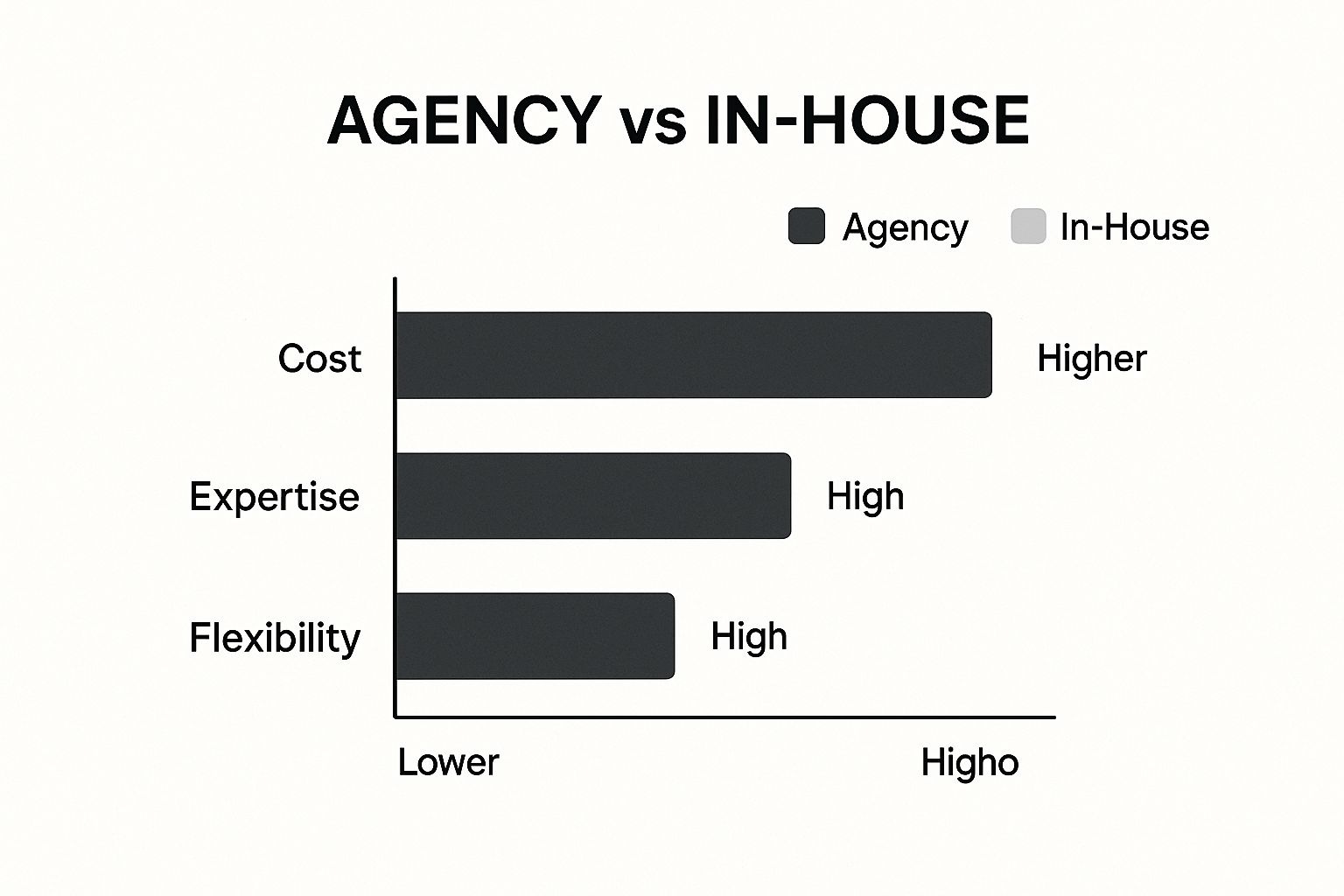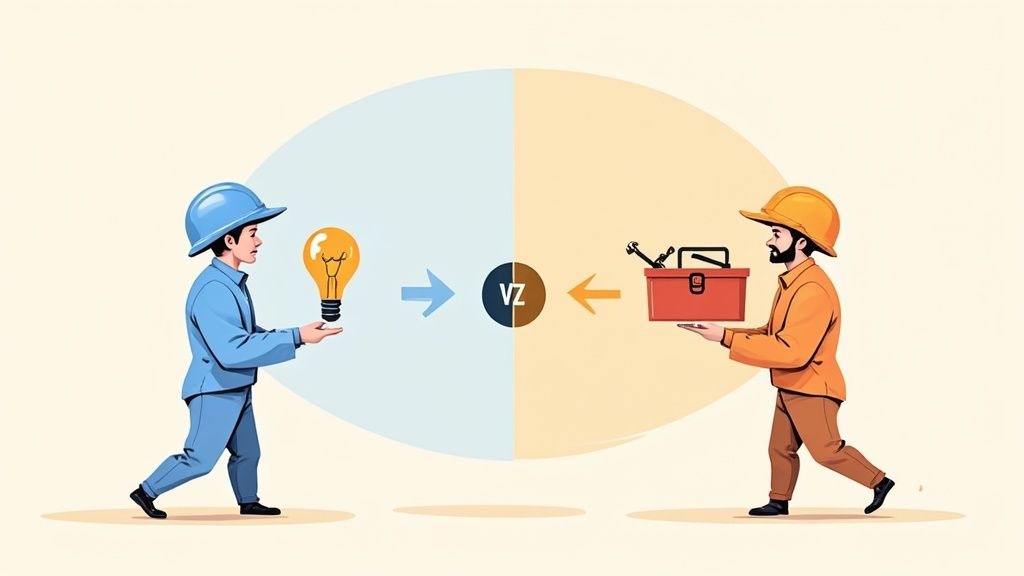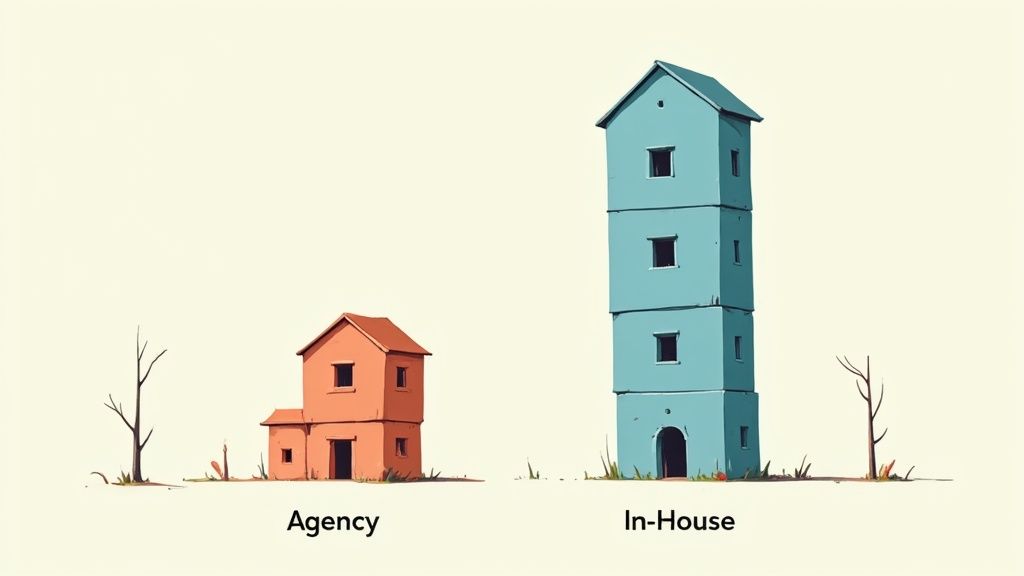The real difference boils down to one thing: a marketing agency gives you a diverse team of specialists on tap, while an in-house team offers complete immersion in your brand and direct control. The right choice isn’t about which one is universally “better.” It’s about which model truly aligns with your company’s immediate goals, budget, and long-term vision.
The Strategic Choice: Marketing Agency vs. In-House
Deciding whether to hire a marketing agency or build your own in-house team is one of those pivotal decisions that will shape your company’s future. It has a direct ripple effect on your budget, your brand’s voice, how quickly you can grow, and, of course, your return on investment.
An in-house team lives and breathes your company culture every single day. This creates an unmatched level of brand alignment and makes internal communication a breeze. Over time, these team members become genuine experts on your specific products, services, and the customers you serve.
But let’s be realistic—building that team is a massive undertaking. You’re looking at a long road of recruitment, hefty overhead costs for salaries and benefits, and the constant need for training to keep their skills from getting stale. Finding a single person who’s a master of everything from technical SEO and paid media to creative content and data analytics is a tall order for any company.
This is exactly where partnering with a marketing agency starts to look very attractive. You get instant access to an entire roster of specialists without any of the HR headaches. Agencies also bring a valuable outside perspective, drawing on their experience across different industries to keep your strategy from going stale.
The core trade-off is simple: in-house teams offer unparalleled brand integration, while agencies provide superior access to specialized expertise and operational agility.
Core Differences: In-House Team vs. Marketing Agency
To help you weigh the options, this table breaks down the fundamental trade-offs between building an in-house team and hiring an agency. It’s a quick reference for the key differences you’ll need to consider.
| Factor | In-House Team | Marketing Agency |
|---|---|---|
| Cost Structure | High fixed overhead (salaries, benefits, tools) | Variable monthly retainer or project fees |
| Expertise | Deep brand knowledge, often generalist skills | Broad, specialized expertise across many channels |
| Scalability | Slow to scale up or down (hiring/firing) | High flexibility to adjust resources on demand |
| Onboarding | Long recruitment and training period | Fast, typically within weeks |
| Control | Full, direct control over strategy and tasks | Collaborative control, less day-to-day oversight |
This table gives you a snapshot, but it’s the interplay between these factors that really matters. Think about your current needs: do you require the flexibility of a variable cost, or can you handle the fixed investment of a full-time staff? Is deep brand knowledge more critical right now than access to a dozen different marketing specializations?

As the chart shows, an agency often provides greater flexibility and a wider range of expertise for a more predictable, variable cost. In contrast, an in-house team is a significant fixed investment that pays off with deep, focused knowledge of your specific business.
A Realistic Breakdown of Marketing Costs

When you’re trying to decide between hiring an agency and building a team, the conversation always comes back to money. But to make a smart call, you need to look past the obvious price tags. The real comparison isn’t an agency retainer versus an in-house salary—it’s the retainer versus the Total Cost of Ownership (TCO) of an internal team.
An in-house marketer’s salary is just the tip of the iceberg. The real expenses start piling up once you factor in all the necessary overhead.
The Hidden Costs of an In-House Team
Hiring your own people involves a lot more than just cutting a paycheck. Every new employee introduces a string of other costs that can easily get overlooked during initial budgeting.
Here’s where the money really goes:
- Benefits and Taxes: Expect to add 20-30% on top of each salary for things like health insurance, retirement plans, and payroll taxes.
- Recruitment Fees: Good luck finding great talent without help. Recruiters often charge 15-25% of a new hire’s first-year salary.
- Tools and Technology: Your team needs the right gear to do their job. Subscriptions for SEO platforms, a CRM, analytics software, and project management tools can quickly climb into the thousands each month.
- Training and Development: Marketing doesn’t stand still, and neither can your team. You’ll have to budget for conferences, workshops, and certifications to keep their skills from getting stale.
Add it all up, and the true cost of just one experienced marketing manager blows past their salary figure. Now, think about what it takes to build out an entire department.
A realistic look at the numbers shows that a full-service in-house marketing team can easily cost a mid-sized company over $750,000 a year in just salaries. That figure doesn’t even touch benefits, software, or training. For more data, you can check out a detailed breakdown on the full cost of in-house marketing teams from Hypelocal.
Understanding Agency Cost Structures
On the other hand, agencies typically offer a much more straightforward, all-in-one cost. You aren’t just paying for someone’s time; you’re buying into a complete service that wraps expertise, high-end tools, and project management into a single, predictable fee.
Agency pricing is usually flexible to fit different needs:
- Monthly Retainer: This is the most common model. You pay a fixed fee for a set of ongoing services, like SEO or content marketing, which makes budgeting a breeze.
- Project-Based Fee: Got a specific one-off task, like a website overhaul or a brand launch? You pay a flat rate for that project alone.
- Performance-Based: In this setup, some of the agency’s pay is tied to hitting specific goals, like a certain number of leads or a sales target. It aligns their success with yours.
With an agency retainer, you’re covering the salaries, benefits, training, and premium tool access for an entire team of specialists. You get a PPC pro, an SEO analyst, a content strategist, and a designer for what might be less than the fully-loaded cost of a single senior marketing manager. That financial efficiency is often the deciding factor for businesses that choose the agency route.
Accessing Specialized Skills and Expertise

One of the biggest factors in the agency vs. in-house debate comes down to talent. A marketing agency is essentially a pre-built hub of specialists. They bring together technical SEO analysts, seasoned PPC strategists, creative directors, and data scientists, giving your business instant access to a deep well of knowledge.
This “plug-and-play” model means you can get sophisticated, multi-channel campaigns off the ground right away. You skip the long and often expensive process of sourcing, vetting, hiring, and onboarding individual experts. It’s like having an entire, fully-staffed marketing department at your disposal from day one.
When you build an in-house team, you usually start with a marketing generalist—a jack-of-all-trades who can handle a bit of everything. While these individuals are incredibly valuable, they can rarely compete with the focused expertise of someone who lives and breathes paid search optimization or spends all day on technical site audits.
The Challenge of In-House Specialization
Trying to build a team of in-house specialists is a serious undertaking. The hunt for top-tier talent in competitive fields like data analytics or performance marketing is slow, and it’s expensive. You’re not just competing with other companies for these pros; you’re also competing with agencies that can offer them more project variety and unique challenges.
Once you land them, the investment continues. You have to provide ongoing training and the right tools to keep their skills sharp. If you don’t, even the best talent can fall behind the curve, which means your campaigns will suffer and innovation will stall. It’s a constant cycle of recruiting and training costs just to keep your expertise current.
The real issue is that elite specialists want to work on specialized problems. An agency setting naturally delivers this, while an in-house role at a company that doesn’t do marketing for a living might not offer the same focused career path.
This is exactly why so many businesses find that going with an agency is a more direct path to getting the expertise they need. In fact, a HubSpot report found that 64% of companies feel agencies provide better access to specialized skills like SEO and analytics than they could ever build themselves. Agencies are designed to pool this expert knowledge, letting you tap into it without the full-time overhead.
The Agency Advantage in Action
Let’s imagine you want to launch a complex lead generation campaign. The plan involves paid social ads, a comprehensive SEO-driven content strategy, and a sophisticated marketing automation sequence.
- In-House Approach: You’d need to hire a PPC manager, an SEO specialist, and a marketing automation expert. If you ask your one marketing generalist to run all three, you’ll likely see mediocre results across the board. Each of these channels requires deep, specific knowledge to truly succeed.
- Agency Approach: An agency can immediately pull in specialists from each discipline. The PPC manager has run hundreds of similar campaigns. The SEO strategist knows exactly how to structure your content to rank. The automation pro can build intricate workflows in their sleep.
This kind of integrated expertise doesn’t just produce better results; it ensures all your marketing channels are working together in harmony. Creating that synergy is incredibly difficult for a small in-house team to pull off. To make it work, strong processes are key; our guide on proven tactics for marketing and sales alignment offers great insights, no matter your team’s structure.
Scaling Up or Paring Down: Which Model Offers More Agility?

Business doesn’t move in a straight line. Your marketing needs will ebb and flow as you chase new opportunities, react to market shifts, or simply navigate seasonal trends. A huge piece of the marketing agency vs in-house puzzle is figuring out which setup can actually keep up. Real business agility—the power to adapt quickly—is what separates companies that thrive from those that just survive.
An agency partner is designed for this very reality. Think of them as a variable expense, a marketing dial you can turn up or down as needed. A hot new opportunity pops up? An agency can throw more specialists at it or boost your ad campaigns almost overnight. Facing a slow quarter? You can scale back your retainer without the gut-wrenching process of laying off team members.
This “on-demand” model is a game-changer. It shifts marketing from a fixed, heavy overhead cost to a nimble, strategic investment that mirrors your immediate business needs and cash flow.
Adapting to Growth and New Demands
Let’s get practical. Imagine your company decides to launch a new product targeting a completely different demographic. Suddenly, you need skills you’ve never needed before, like TikTok video production or niche influencer marketing. Your current in-house team is great at what they do, but this is a whole new ballgame.
- With an In-House Team: You’re now stuck in a slow, expensive hiring cycle. You have to draft job descriptions, sift through resumes, interview candidates, and then get the new person up to speed. This process easily takes months, and by the time you’re ready, your window of opportunity might have already closed.
- With a Marketing Agency: This is just a phone call to your account manager. A good full-service agency already has video producers and influencer experts on staff. They simply add that service to your scope, and the new campaign can be live in weeks, not months.
The difference is stark. An internal team offers deep-seated stability, but that same stability can become a lead weight when you need to move fast and grab a competitive edge.
Managing Contraction and Shifting Priorities
Agility isn’t just about grabbing growth; it’s also about smart downsizing. What happens when market conditions sour and you have to pull back on the marketing budget? With permanent staff, your options are painful and limited.
Scaling down an in-house team almost always means making difficult personnel decisions that can crush morale and poison company culture. An agency relationship, on the other hand, can be adjusted with a simple contract modification, protecting your internal team while you weather the storm.
This ability to resize your marketing investment without causing internal chaos is a core strength of the agency model. It gives leadership the power to make sharp, surgical financial adjustments.
At the end of the day, an agency acts like a volume dial you can fine-tune. An in-house team is more like an on/off switch—a much blunter instrument for navigating the real world of business.
Owning Your Brand Voice and Company Culture
When you’re weighing a marketing agency vs in-house, the debate usually revolves around cost and expertise. But what about the soul of your brand? That’s rooted in your company culture, and it’s where an in-house team has a distinct, built-in edge. They don’t just learn about your brand; they live and breathe it every day.
Your internal team is fully immersed in the company’s mission, its core values, and all the little quirks that make your brand what it is. This deep connection ensures that every blog post, social media update, and campaign feels genuinely authentic. They hear the inside jokes, participate in the same all-hands meetings, and share a real passion for what you’re building.
This closeness also sparks incredible collaboration. A marketer can just walk over to a developer’s desk to get the details on a new feature or grab coffee with someone from sales to hear about customer feedback. That direct line is gold for creating a unified message and makes getting things done so much faster.
The Nuance of Brand Authenticity
An outside agency, no matter how talented, will always start with a learning curve. You have to teach them your culture, your internal lingo, and the unwritten rules that shape your brand’s personality. A top-tier agency can feel like a true partner, but they will always be looking in from the outside.
An in-house team speaks your brand’s language fluently. An agency has to study it first. For companies that thrive on authenticity, that difference is everything.
Think about a founder-led startup with a very specific, quirky sense of humor. That unique voice can easily get watered down or lost in translation when an agency tries to replicate it. An in-house marketer who has been part of that culture since day one can nail that tone without even trying. It’s the difference between an echo and the real thing.
Bridging the Culture Gap with an Agency
Choosing an agency doesn’t mean you have to sacrifice your brand voice, but you do have to be intentional about protecting it. The trick is to treat your agency like a genuine extension of your team, not just another vendor on the payroll.
You can close the culture gap by taking a few key steps:
- Create comprehensive brand guidelines: This is non-negotiable. A detailed guide acts as your brand’s bible. If you don’t have one, learning how to create brand guidelines is the most important first step you can take to keep everyone on the same page.
- Invest in a deep onboarding process: Give the agency team dedicated time with your key people—from the C-suite to customer support—so they can truly soak up the culture.
- Maintain a strong internal point of contact: Appoint an internal brand champion to review and sign off on all agency work. This person’s job is to be the ultimate guardian of your voice and values.
At the end of the day, an in-house team will always have the home-field advantage when it comes to cultural fit. But with smart processes and a truly collaborative spirit, an agency can absolutely learn to champion your brand’s unique voice.
How to Choose the Right Model for Your Business
The classic debate of marketing agency vs. in-house isn’t about finding one right answer for everyone. It’s about finding the right fit for your company’s unique situation—your current stage, your specific goals, and the resources you have on hand. The perfect choice for a scrappy startup trying to make a name for itself is going to look completely different from what an established enterprise needs to maintain brand consistency.
To move from a theoretical pros-and-cons list to a real, actionable decision, you need to look inward. Analyzing your business through the lens of your immediate needs and long-term vision is the only way to make a practical choice.
A Framework for Startups and Growth-Stage Companies
If you’re an early-stage business, your world probably revolves around rapid growth, grabbing market share, and generating leads—all while working with a tight budget. In this environment, you need speed and a diverse set of skills, and you need them yesterday.
This is where a marketing agency often shines. Hiring an agency gives you instant access to a full team of specialists, from paid media wizards to SEO pros, without the huge upfront cost and slow ramp-up time of building a team from scratch. It’s a “plug-and-play” solution that lets a startup run sophisticated, multi-channel campaigns right out of the gate, giving them the agility they need when it matters most.
Key takeaway: If your main goal is to grow as fast as possible and you need a wide range of marketing skills without the high fixed overhead of salaries, an agency is usually the most efficient way to get there.
A Framework for Established Enterprises
Once a company is firmly established, the game changes. The focus tends to shift from pure customer acquisition to things like brand stewardship, fostering loyalty, and deeply integrating with the market. At this stage, having tight control over your brand’s voice and ensuring marketing is perfectly in sync with departments like sales and product development is absolutely critical.
An in-house team is often the clear winner here. Your own employees live and breathe the company culture every single day. This ensures that every blog post, ad, and social media update feels authentic and aligns perfectly with your core values. That kind of direct collaboration creates a seamless customer experience that an outside partner often struggles to replicate.
Embracing the Hybrid Model
More and more, companies are figuring out that this isn’t a simple either/or decision. The hybrid model is gaining serious traction because it offers a “best of both worlds” solution, blending the strategic direction of an internal team with the tactical firepower of an external one.
So, how does a typical hybrid setup work?
- An internal marketing leader or a small core team is in the driver’s seat. They set the high-level strategy, protect the brand voice, and manage relationships with key internal stakeholders.
- A partner agency takes on the specialized, technical, or resource-heavy tasks. This could mean running large-scale PPC campaigns, conducting complex technical SEO audits, or handling a massive video production project.
This approach gives you the best of both worlds: you keep tight control over your brand’s core mission while tapping into an agency’s specialized expertise for tasks that just aren’t practical to handle internally.
If you decide an agency partner is in your future, it’s crucial to understand how to choose a marketing agency that will integrate smoothly with your team. At the end of the day, the right structure is simply the one that sets you up for sustainable, long-term success.
Got Questions? Let’s Get Them Answered.
As you weigh the pros and cons of an agency versus an in-house team, you’re bound to have some specific questions pop up. Let’s tackle some of the most common ones I hear from business leaders, so you can make a decision with real clarity.
What Is a Hybrid Marketing Model, Anyway?
Think of the hybrid model as the “best of both worlds” approach. It’s not strictly one or the other; you’re blending an internal team with an external agency to get the exact support you need.
A common setup involves having a core in-house marketer (or a small team) who lives and breathes your brand. They own the high-level strategy and make sure the brand voice stays consistent. Then, they bring in an agency partner to handle the really specialized or resource-intensive work—things like technical SEO, large-scale paid ad campaigns, or complex video production.
This model is a fantastic fit when you need that deep, day-to-day brand understanding but can’t possibly justify hiring full-time specialists for every single marketing channel. It gives you strategic control right where you need it, plus the ability to scale up or down with an agency’s help.
How Do I Actually Measure the ROI?
Measuring your return on investment is critical, but the math looks a little different for each path. While both models should ultimately be measured against core business goals like leads and revenue, how you calculate the “I” (your investment) changes.
- For an In-House Team: To get your ROI, you’ll divide the profit generated by marketing by the team’s total cost. And I mean total. This isn’t just salaries. You have to factor in benefits, payroll taxes, training costs, recruitment fees, and all the software and tools they need to do their jobs.
- For a Marketing Agency: The calculation is a bit more straightforward. You divide the marketing-generated profit by the total agency fees, which usually consist of retainers or project-based costs. This gives you a much cleaner, all-in number for your marketing spend.
The most important thing here is consistency. No matter which model you choose, you have to nail your revenue attribution. If you can’t accurately trace revenue back to specific marketing efforts, you’ll never get a true picture of your return on investment.
What Are the Biggest Red Flags When Hiring an Agency?
Vetting potential agency partners is a huge step, and it’s easy to get swayed by a slick presentation. Keep an eye out for these major warning signs:
- Vague, Over-the-Top Promises: If an agency guarantees you “#1 rankings on Google” or talks about success in fuzzy, undefined terms, be skeptical. Real marketing is about strategy and continuous improvement, not magic wands.
- A Lack of Transparency: This is a big one. An agency should be an open book. If they’re cagey about their process or, worse, refuse to give you full access to your own ad accounts and analytics, you should run, not walk, away.
- The “One-Size-Fits-All” Pitch: A great partner invests time upfront to understand your business, your customers, and your unique challenges. If you get a generic, cookie-cutter proposal that could apply to any company, they haven’t done their homework.
At ReachLabs.ai, we don’t just work for you; we work with you. We act as a strategic extension of your team, bringing specialized expertise that’s always aligned with your brand to drive results you can actually measure. Learn how our collective approach can elevate your marketing.





